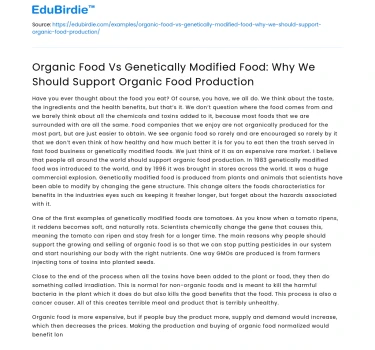Introduction
The debate between organic and genetically modified organisms (GMO) food production is a critical issue in the contemporary agricultural landscape. As global food demand continues to rise, stakeholders are confronted with the challenge of choosing sustainable and health-conscious food production methods. Organic food production is increasingly recognized as a viable solution to this challenge. It emphasizes environmentally friendly farming practices, biodiversity, and natural pest management, offering a stark contrast to the biotechnological interventions seen in GMO production. This essay argues in favor of supporting organic food production over GMOs. It examines the environmental, health, and socio-economic benefits of organic methods, while addressing common counterarguments. By highlighting the potential of organic farming to foster a sustainable food system, this essay aims to demonstrate its superiority over GMO-based agriculture.
Environmental Benefits of Organic Farming
Organic farming practices offer substantial environmental benefits compared to GMO-based agriculture. Unlike GMO crops, which often rely heavily on chemical inputs, organic agriculture prioritizes soil health, water conservation, and biodiversity. According to a study published in the journal Nature Sustainability, organic farms support 34% more species than conventional farms, indicating a higher level of biodiversity (Tuck et al., 2014). This biodiversity is crucial, as it enhances ecosystem resilience and reduces vulnerability to pests and diseases.
Save your time!
We can take care of your essay
- Proper editing and formatting
- Free revision, title page, and bibliography
- Flexible prices and money-back guarantee
Additionally, organic farming promotes soil health through practices such as crop rotation, composting, and reduced tillage. These methods enhance soil structure, improve nutrient cycling, and increase carbon sequestration, which can mitigate climate change effects. In contrast, GMO crops often necessitate monoculture practices and heavy use of synthetic fertilizers and pesticides, leading to soil degradation and water pollution. A report by the Rodale Institute (2011) highlights that organic systems use 45% less energy and release 40% fewer carbon emissions than conventional methods. This demonstrates organic farming's potential to contribute positively to environmental sustainability.
Thus, the environmental benefits of organic farming provide compelling reasons to support it over GMO food production. By maintaining biodiversity, enhancing soil health, and reducing greenhouse gas emissions, organic agriculture aligns with the goals of sustainable development and environmental conservation.
Health Implications and Safety Concerns
The health implications of consuming organic versus GMO foods have been a topic of considerable debate. Organic foods are often perceived as healthier due to the absence of synthetic pesticides and fertilizers. A meta-analysis published in the British Journal of Nutrition found that organic crops contain higher levels of antioxidants and lower levels of pesticide residues compared to conventional crops (Barański et al., 2014). These antioxidants are beneficial for human health, offering protection against oxidative stress and inflammation.
In contrast, GMOs have raised safety concerns due to the potential for unintended genetic mutations and allergenic effects. Critics argue that the long-term health effects of consuming GMOs remain uncertain, as comprehensive longitudinal studies are lacking. A report by the National Academies of Sciences, Engineering, and Medicine (2016) acknowledged that while GMOs are generally considered safe, there is a need for ongoing monitoring and research to address potential health risks. This uncertainty underscores the cautionary principle, advocating for safer alternatives such as organic foods.
Furthermore, the organic certification process involves rigorous standards that ensure the absence of harmful chemicals, providing consumers with a higher level of assurance regarding food safety. Therefore, supporting organic food production not only reduces exposure to potentially harmful substances but also promotes greater nutritional quality, thereby offering a more health-conscious choice for consumers.
Socio-Economic Considerations: Supporting Local Communities
Organic farming provides significant socio-economic benefits, particularly for local communities and small-scale farmers. By emphasizing traditional farming techniques and local resource use, organic agriculture can reduce dependency on expensive chemical inputs and patented GMO seeds. This economic self-reliance is particularly beneficial for smallholder farmers in developing countries, where access to such inputs is limited.
Moreover, organic farming often supports local economies by creating jobs and fostering community-based markets. According to the Organic Trade Association (2017), the organic sector generates more on-farm jobs than conventional agriculture, with organic farms employing an average of 30% more workers per acre. This not only enhances rural livelihoods but also contributes to community stability and resilience.
Critics argue that organic farming may result in lower yields compared to GMOs, potentially impacting food security. However, evidence suggests that yield gaps can be mitigated through improved organic practices and research investment. A study in the journal Nature Plants (Ponisio et al., 2015) found that organic farming can achieve competitive yields, especially in diverse farming systems. By supporting organic agriculture, we can promote sustainable economic development while maintaining food sovereignty and security.
Conclusion
In conclusion, organic food production offers a sustainable and health-conscious alternative to GMO-based agriculture. The environmental benefits, including enhanced biodiversity and reduced carbon emissions, coupled with the health advantages of reduced chemical exposure, make organic farming a preferable choice. Furthermore, the socio-economic benefits of supporting local communities and fostering economic self-reliance underscore its potential to contribute to global food security. While challenges such as yield gaps exist, they can be overcome through research and investment in organic practices. By prioritizing organic food production, we can create a more sustainable, equitable, and healthy food system for future generations.
Transitioning from GMO to organic agriculture requires a paradigm shift in how we perceive food production. It involves recognizing the long-term benefits of sustainability over short-term gains. As consumers, policymakers, and stakeholders align with this vision, the potential of organic farming to address the pressing challenges of our time becomes increasingly apparent. Supporting organic farming is not merely a choice for individual health, but a commitment to the well-being of our planet and its inhabitants.






 Stuck on your essay?
Stuck on your essay?

